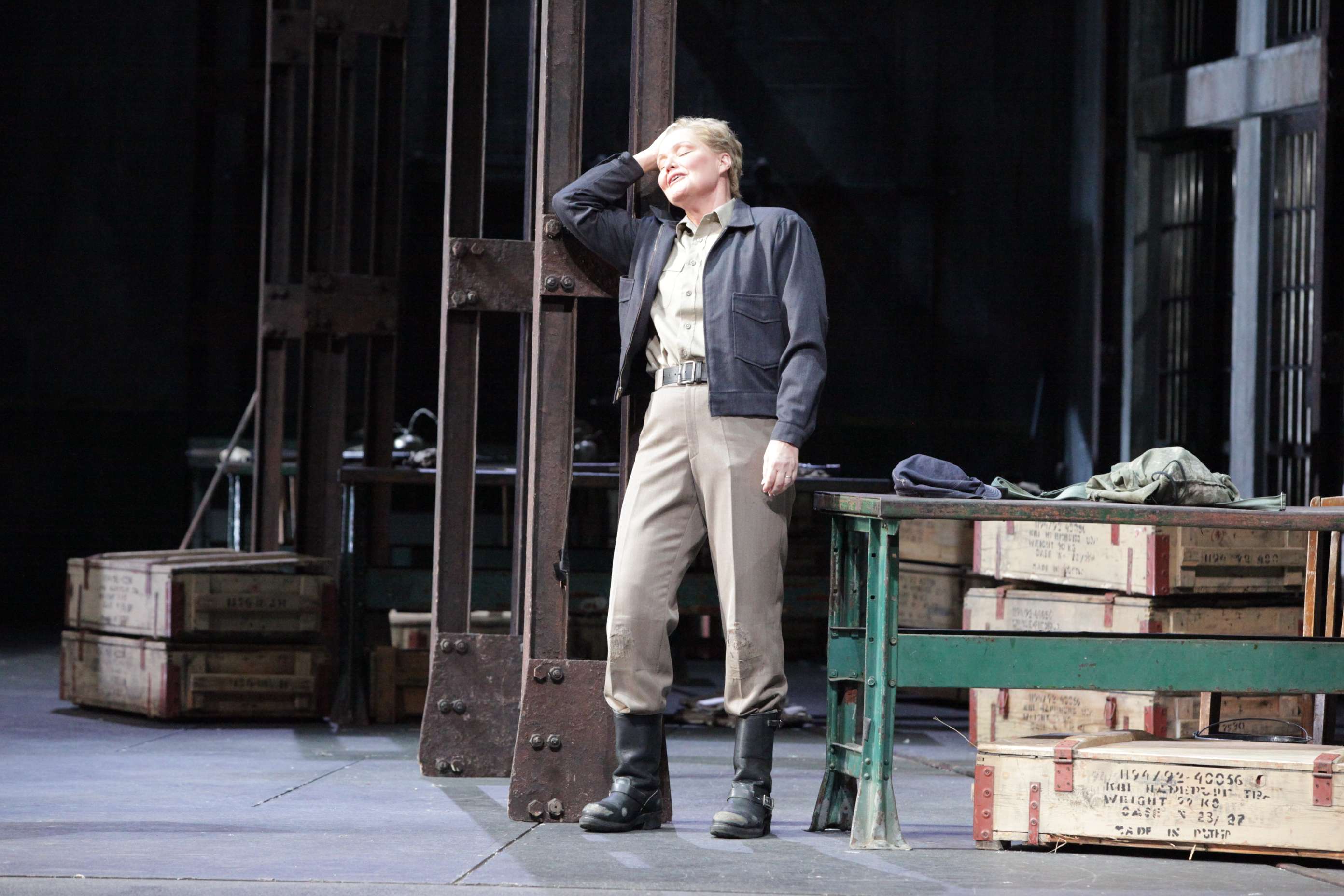|
Back
Pushing Boundaries, with Mixed Results Houston
Brown Theater, Wortham Center
10/28/2011 - and November 1*, 5, 10, 13, 2011
Ludwig van Beethoven: Fidelio, opus 72
Norman Reinhard (Jaquino), Brittany Wheeler (Marzelline), Kristinn Sigmundsson (Rocco), Karita Mattila (Leonore/Fidelio), Tómas Tómasson (Don Pizarro), Brendan Tuohy (First Prisoner), Mark Diamond (Second Prisoner), Simon O'Neill (Florestan), Kyle Ketelsen (Don Fernando)
The Houston Grand Opera Orchestra and Chorus, Michael Hoffstetter (Conductor)
Jürgen Flimm (Director), Robert Israel (Set Designer), Florence von Gerkan (Costume Designer), Duane Schuler (Lighting Designer)

K. Mattila (© Felix Sanchez)
It's odd that the composer of some of the most dramatic music in history was not a naturally gifted opera composer. Beethoven could make the listener tremble with his new ways of treating orchestra, keyboard and string quartet, but seemed unusually mystified by the human voice. Fidelio, his sole completed opera, could be the poster child for the imperfect masterpiece. Even after extensive edits to score and libretto, the structure is still lopsided and the plot, while sensible on the surface, verges on the absurd under closer scrutiny. Thankfully, Beethoven's compositional acumen more than makes up for whatever is lacking, and there are some truly magnificent numbers in the work. Fidelio/Leonore is a thoroughly explored character by operatic standards (the others in story seem merely sketches), and the choral numbers are impressively powerful. Like the opera itself, Houston Grand Opera's current production as a whole is impressive and enjoyable, but there are many disappointing aspects that almost threaten to tip the balance.
Karita Mattila's wonderfully sung and acted Fidelio, while glorious unto itself, seems to set the bar far too high for the rest of the cast. While HGO is usually excellent at pulling together singers that match or come very close to matching their celebrity guests, Mattila simply outsings everyone in this ensemble. This isn't saying that the others are bad by any means, just that Mattila is that good. The opera's roles require power and finesse in a perfectly-balanced combination, and this is where Mattila shines. Her bell-like purity of tone, capable of projecting at all dynamics and registers, makes the nearly-impossible demands of the role seem like child's play. "Abscheulicher!" is a perfect example, a highlight of the score that is turned in this production into a highlight of the evening. She is virile throughout the aria, projecting fearlessness in impressive feats of tonal and dynamic control. The horn trio is also technically flawless, and Michael Hofstetter consistently shifts gears and matches Mattila's rubato seamlessly.
Other members of the cast strive to achieve equal feats of power, but their voices either become overextended (often the case with Kristinn Sigmundsson's Rocco) or the tone spreads (Norman Reinhard's Jaquino and Tómas Tómasson's Don Pizarro occasionally suffer this flaw). Sigmundsson is stately enough as it is and has a clear voice when singing at a comfortable dynamic level. Tómasson snivels deliciously as Pizarro and doesn't need to overdo it. Reinhard is more balanced as Jaquino, but seems to get overexcited when director Jürgen Flimm puts a gun in his hand. Simon O'Neill's Florestan is vocally a great match for Mattila, but when his character is finally introduced, Flimm subverts the potential dynamism of the duo with questionable directorial choices. Admittedly, the raw abandon of many of the singers adds some excitement to the performance, but every time Mattila unleashes her magnificent voice, one can't help but think "Ah! That's how it's done!" The HGO chorus match her splendor, working magic every time they're on stage, and producing the most ecstatic moment of the evening in their perfectly balanced, exquisitely hushed first statement of "O welche Lust."
These quibbles with the cast aren't deal breakers, but those with the staging almost are. The most obvious directorial miscue comes near the end, when Leonore reveals herself to Florestan. "Du wieder nun in meinen Armen!" exclaims Leonore, to which Florestan replies "O Gott, wie gross ist dein Erbarmen!" With all this talk of being in each others' embrace, one wonders why Flimm has directed Mattila and O'Neill to sing from opposite sides of the stage.The moment is so bewildering--shouldn't they actually be hugging if they're singing about hugging?--that it's difficult to remember if they ever once embrace, let alone kiss, in the final scene. Is this putting too fine a point on one directorial choice? I think not. The result is that Leonore's longing for Florestan, which in Act I is a subordinate but powerful plot point, fails to convince when it finally comes to the fore. There is no passion between the reunited lovers. Leonore could just as easily be rescuing her brother or father. Climax becomes atrophy, as Flimm shifts the focus to Pizarro being prepared for the hangman's noose and Marzelline pouting in the corner. This is, of course, the director's prerogative, and seems done purposely. When Florestan receives bread from Leonore and Rocco earlier in the act, he holds it up like the Eucharist to the audience and breaks it before consuming. Is Flimm suggesting Florestan is a Christ figure? Is this the reason for the lack of physical affection between Leonore and him at the end? This is all even more confusing after the apparent assault by machine gun fetish that runs through Act I. Every chance Flimm gets, he has someone on stage point a gun at someone else. It's all very confusing and, at points, a disturbing distraction from the inherent charm and naivety of much of the score.
Thankfully, Hofstetter's perfect combination of energy and repose, flawlessly reflected by the orchestra's playing and coordination with the stage, makes it possible to enjoy the performance by focusing on the score and letting the music speak for itself.
Marcus Karl Maroney
|